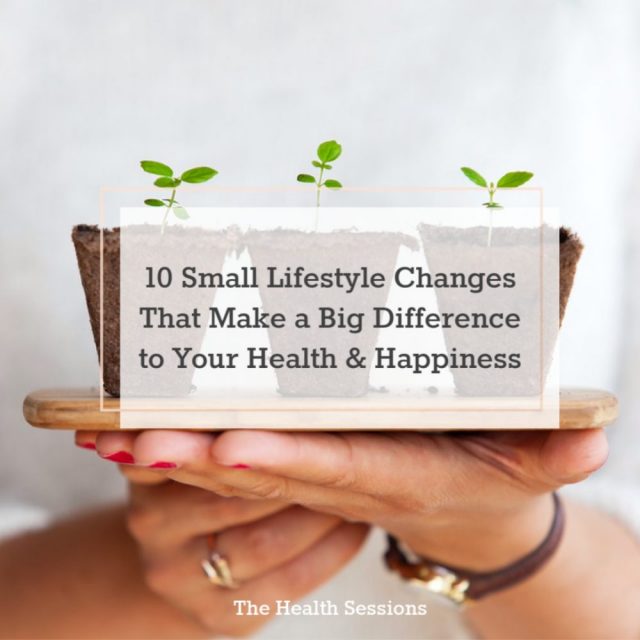Warning Signs: Are You Listening to What Your Body Is Telling You?

Do you ever fantasize about drastically changing your lifestyle? No more takeout while watching your favorite show – no, starting Monday, you will eat ‘clean’, start a new exercise program and add wellness routines to your daily schedule.
It’s tempting to think that going all-in on a healthy lifestyle will make you feel better instantly. But even with the best intentions, most of us give up on our new diet and stop going to the gym within weeks. Why? Because you do many things like eating breakfast, buying groceries and getting ready for bed on autopilot. It requires a lot of mental energy to monitor and adjust your behavior all day long – ‘oh right, no more sugar in my coffee’. And building new habits takes time.
So when it comes to making lifestyle changes that last, starting small is often best.
And if you think that tiny adjustments can’t make a significant impact, think again.
Take a look at 10 small lifestyle changes that make a big difference to your health and happiness.
This blog post contains some affiliate links to resources you may find useful. All opinions are my own.
The single biggest culprit of added sugars and empty calories in our Western diet is your soft drink. One glass of soda or lemonade contains 7 to 10 teaspoons of sugar, but these sweet beverages don’t make you feel as full as eating the same amount of calories would. The consequence? Not only do you gain weight, but drinking ‘just’ 1 or 2 cans of sugary drinks a day increases your risk of getting diabetes type 2 by 26%.
Unfortunately, diet soda and healthy-looking fruit juices aren’t great alternatives either. So one simple way you can improve your health is to swap soft drinks for (flavored) water, veggie juices, (herbal) teas or a simple cup of coffee (if you don’t mind the caffeine).
For more ideas on how you can slowly reduce your sugar intake, check out ‘Curb Your Cravings: 6 Steps to Resisting Sweet Temptations’.
It may not always feel that way – especially if you’re chronically ill – but human beings were born to move. Our ancestors spent a lot of time each day collecting water, gathering food and building shelters. And although we’ve evolved over time, our bodies aren’t well-equipped to sit still and stare at screens for hours on end.
Moving your body throughout the day has all kinds of benefits for your health. Being active helps you build and maintain strong muscles and bones, improves your metabolism, keeps your heart healthy and boosts your brain functioning. What’s more, regular exercising helps to reduce chronic inflammation in the body – the underlying cause of many chronic diseases.
And the great news is: you don’t have to do high-intensity workouts in the gym to get these benefits. Low-level aerobic activity like walking, swimming and going for a bike ride work just as well.
So roll out your yoga mat and do one series of (modified!) sun salutations to start your day. Go for a short walk after lunch. Instead of meeting friends over drinks, play football in the park or go for a hike to catch up. If you’re chronically ill, you could try gentle exercises in bed or gradually rebuild your fitness with walk training.
Finding fun ways to incorporate movement into your daily life can make a big difference to your health, happiness and daily functioning.

Each morning, when light enters your eyes, it signals to your body clock that it’s time to start the day. This, in turn, triggers a cascade of physiological reactions, like raising your body temperature and producing cortisol.
To optimize the workings of your body clock and feel energetic, you should expose yourself to natural daylight in the morning. Simply open up the curtains, sit by the window when you have your breakfast or drink your cup of coffee out on the balcony. If you can, going for a morning walk is a powerful way to boost your mood and energy levels.
A great example of small changes that can make a big difference. This simple gratitude exercise turns out to be one of the most effective ways to boost your happiness. According to Martin Seligman, founder of positive psychology, writing down what went well that day trains your brain to notice and focus the positive things in life. And this positive outlook on life is linked to lower rates of depression and heart disease, and even a longer lifespan.
So grab a journal or notebook – I highly recommend Emily McDowell’s collection – and start jotting down the good things that happened to you today.

You don’t have to change your diet overnight when you want to start eating healthier. What if you first focus on upgrading one meal a day?
Instead of going from microwave meals to plant-based cooking from scratch, you can give your breakfast a healthy makeover. Green smoothie bowls and overnight oats, for example, are easy to prep in advance and you can adjust them to your liking. Try out different (nut) milks and play around with healthy toppings.
Of course you could also focus on bringing healthy snacks like fruit, nuts or a boiled egg with you instead of eating that seemingly healthy granola bar. Or learn to cook healthy dinners even when you’re tired.
Once that one meal becomes a habit you no longer have to think about, you can give another meal a healthy makeover – if that’s what you want of course!
We all intuitively know how good it feels to spend time in nature – and research backs that up. The healing combination of fresh air, vitamin D-producing sunshine and being in green surroundings has lots of benefits for your health. In fact, a growing number of doctors are actually prescribing ‘nature time’ as part of their treatment plan.
That’s because being outdoors lowers your blood pressure, improves your immunity and promotes deep sleep. What’s more, spending time in natural surroundings eases mental fatigue, anxiety and depression.
Studies suggest that you should get 120 minutes of outdoors time each week – which translates to 17 minutes a day. Even if you live in an urban area, you can probably find patches of green to go for a walk every day. On the weekend, you could swap the concrete jungle for a visit to the park or a botanical garden. If you struggle to get outside due to chronic illness or a busy office job, try these 11 ideas to still get your daily nature fix.

Stress is the number one problem of our modern way world – and the root cause of many diseases. Even worse, chronic stress aggravates your existing health problems.
Obviously, the best solution would be to prevent getting overwhelmed and burnt out in the first place. And although you can change your mindset and simplify your life, it’s impossible to avoid stress all together.
That’s why it’s important to develop healthy ways to deal with stress. Because when you’re stretched thin, it’s tempting to poor yourself another glass of wine, grab a bag of chips and go on an online shopping spree to forget about your worries for a while. But in the long run, your liver and bank account won’t be so pleased with those coping strategies.
So experiment with healthier ways to reduce your stress levels. Maybe you feel a lot better if you release all those pent-up emotions on a punching bag or by singing your heart out. Or perhaps soothing activities like breathing exercises, gardening or curling up on the couch with a good book help you relax.
You may not be able to avoid stressful situations, but you can control how you react to it.
Sleep is the foundation of good health. You’re probably all too familiar with all the ways that a lack of sleep hurts your health and daily functioning.
One helpful strategy to get enough zzz’s each night is to give yourself a bedtime. Sounds childish, I know. But there’s always one more email to check, just one more episode to watch, one last scroll through social media. Having a set bedtime can help you create a healthy sleep routine. If you aren’t sure what time you should go to bed, just count back 8 hours from when you have to get up the next morning.
But if you actually want to be able to fall asleep when bedtime arrives – and not just toss and turn for hours – you need to make sure your body and mind are relaxed. That’s why I recommend creating a bedtime ritual – a daily routine that signals to your brain it’s time to wind down and prepare for sleep.
The first step is to stop doing stimulating activities one hour before bedtime. Yes, that includes working late at night or watching news stories that upset you. Instead, do something that relaxes your body and calms your mind. You could have a warm bath, listen to soft music or drink a cup of camomile evening tea – whatever works best for you.

There are countless philosophies on healthy eating, but almost all agree on one thing: vegetables are vital for your health. That’s because vegetables are packed with disease-fighting nutrients and healthy fibers, yet low in calories. According to Harvard Health, a diet rich in fruit and veggies helps to prevent heart disease, stroke, digestive illnesses and certain types of cancer.
And still, most of us fail to eat our ‘five a day’ or 200 grams of vegetables. That number does not include potatoes, nor does it emphasize that it’s the minimum recommended amount. Recent studies suggest that for optimal health, we should eat up to 10 portions of fruit and vegetables each day.
Ok, so consuming more vegetables is one small change that makes a big difference. But how do you actually eat at least 3 portions or 200 grams of vegetables? Gobbling down over dinner may seem like a daunting task. My trick? Try to eat vegetables with most meals. Start your day with a savory breakfast bowl, add slices of tomato to your regular sandwich and snack on crunchy veggies with a tasty dip. You can also easily sneak in extra veggies through green smoothies, side salads or warming soups.
Focusing on adding vegetables to most meals is a simple way to boost your nutrient intake without overhauling your entire diet all at once.
Where would we be without our family and friends, fun coworkers and kind neighbors? Having a strong support system is linked to a better physical and mental health, and even a longer lifespan. People who are lonely and isolated, on the other hand, are more likely to suffer from depression, heart disease and stroke, and weakened immunity.
But building and maintaining supportive relationships isn’t always easy, especially when you’re going through tough times. Maybe you don’t have the energy to reach out and connect. Or you don’t want to burden anyone with your problems, if you manage to find the words to express the emotional rollercoaster you’re going through.
How can you still nurture your relationships when you’re struggling? Here are some ideas that could help:
Because as the saying goes, love does not make the world go round, but it makes the journey worthwhile.
I’d love to know, which small lifestyle change has made a big difference to your health and happiness?
If you’d like to get more tools and tips on living a good life with chronic illness, sign up for your weekly health sessions now. Tried-and-tested trick for all energy levels delivered straight to your inbox!